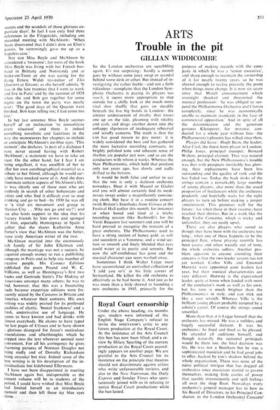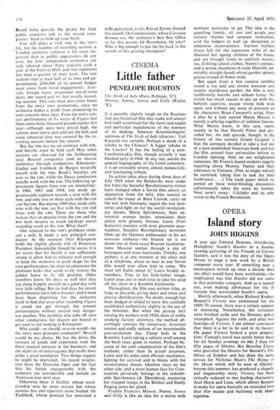ARTS
Trouble in the pit
GILLIAN WIDDICOMBE
So the London orchestras are squabbling again. Its not surprising: hardly a month goes by without some juicy swap or scandal behind some desk or other. But instead of in- vestigating the rather feeble—and not a little ridiculous—complaint that the London Sym- phony Orchestra is paying its players too much, it seems more appropriate to step outside for a chilly look at the much more vital slow shuffle that goes on steadily beneath the five big bands in London: the sinister undercurrent of rivalry that tosses one up on the tide, gleaming with vitality and cash, and drags another down into the unhappy slipstream of inadequate rehearsal and scruffy concerts. The truth is that the Ls° has good reason to pay more: it is widely considered the best and has gathered the most lucrative recording contracts; its brighly polished tone and inherent sense of rhythm are popular just now, and so are the conductors with whom it works. Whereas the New Philharmonia, which held that position only ten years ago, has slowly and sadly drifted to the bottom.
It would be both false and unfair to say that the NPO is only a skeleton orchestra nowadays. Hear it with Maazel or Giulini and you will almost certainly find its weak- nesses swept under a magnificently convinc- ing cloth. But hear it in a routine concert (with Britten's Interludes from Grimes at the Festival Hall earlier this month, for instance) or when bored and tired at a tetchy recording session (like Barbirolli's for the Verdi Requiem last summer) and you will be hard pressed to recognise the remains of a great orchestra. The Philharmonia used to have a string section of honey gold, as soft and succulent as a Veronese. and a wind sec- tion so smooth and finely blended that eyes could water at its purity and serenity. But now the self-confidence has gone and the musical character can seem washed away.
Sometimes I think Walter Legge must have accumulated an unrivalled collection of 'I told you so's' in his little corner of Switzerland. He killed the old orchestra as effectively as he had borne it. And just as he was more than a little shrewd in founding a new orchestra. in 1945, primarily for the purpose of making records with the com- pany in which he was a 'senior executive', and sharp enough to maintain the ownership of it for nearly twenty years. so he was shrewd enough to realise precisely the point when things must change. It is now six years since that March announcement which overnight shocked and threatened the musical profession: 'he was obliged to sus- pend the Philharmonia Orchestra and Chorus completely, since he was economically unable to maintain standards in the face of commercial opposition.' And in spite of all the determination and the generous gestures Klemperer, for instance. con- ducted for a whole year without fees—the Philharmonia's phoenix has wilted since then.
Players did leave: Hugh Bean, the leader; Alan Civil, the finest horn player in London; Philip Jones. principal trumpet; Bernard Walton, principal clarinet. That was natural enough, but the New Philharmonia's trouble was that with prospects inevitably less glow- ing, their replacements have been less outstanding and the quality of rank and file has faded too. Today the back desks of the strings contain a remarkably large number of young players; also more than the usual proportion of freelancers while the orchestra prudently and hopefully waits for the right players to turn up before making a proper apnointment. This promises well for the future: for when those in their twentie.; have reached their thirties. But in a work like the Berg Violin Concerto, which is tricky and unfamiliar, they are easily upset.
There are also players who sound as though they have been with the orchestra too long : when one of these happens to be the principal flute, whose playing recently has been coarse and often weirdly out of tune, the whole orchestra suffers. Another pro- blem apparent to anyone attending their concerts is that the two-leader system has not yet worked. Carlos Villa and Emanuel Hurwitz were appointed joint leaders last year, but their musical characteristics are very different. Hurwitz is the experienced leader, quite at home when landed with most of the conductor's work as well as his own; but his tone is much brighter than the Philharmonia's in style, and can stick out like a sore scratch. Whereas Villa is the brilliant young player probably tempted by a, soloist's career. Of course the strings sound unsettled.
More than that, it is Legge himself that the orchestra has missed. He was a ruthless and hugely successful dictator. It was his orchestra : he fixed and fired as he pleased. He attended all auditions himself, and though naturally the sectional principals would be there too, the final decision was his. He was not a Beecham but he was a sophisticated musician and he had good jobs to offer, backed by EMI'S shadow behind the whole organisation. There was none of the naive political intrigue that has dogged all orchestras since musicians started to govern themselves, making little castles of power that tumble intermittently and spill feelings all over. the shop floor. Nowadays every orchestra's general manager has to bow to his Board of Directors, to his Principal Con- ductor, to the London Orchestral Concerts' Board (who provide the grants for their public concerts) and to the record com- panies: bard to hold up your head. Esit still plays a vital role in the NPO'S life, for the number of recording sessions a London orchestra achieves is far more im- portant than its public appearances. In any case, the four independent orchestras are only allowed about thirty concerts each a year in the Festival Hall, and that represents less than a quarter of their work. The NPO reckons that at least half of its time and ap- proximately £500,000 of its annual budget must come from hired engagements: festi- vals, foreign tours, occasional out-of-town dates, sac sound and Tv, but mostly record- ing sessions. This sum must also cover losses from the reeo's own promotions, since no orchestra makes a profit from promoting its own concerts these days. Even the teeo's con- cert performance of Le nozze di Figaro lost them some three thousand pounds earlier this year—although seats were priced high, the soloists were starry and sold out the hall, and some rehearsal time was covered by the re- cording sessions before the concert. But the elm has no set contract with EMI, and breaths must be held each May when sessions are allocated for the forthcoming year. Record companies tend to choose orchestras through conductors. Klemperer, Giulini and Fruhbeck de Burgos naturally record with the NPO; Boult's loyalties are now to the LPO; while the Decca conductors usually work with the Lso. The following ap- proximate figures from EMI are interesting: in 1966, 1967 and 1968, EMI made ap- proximately eighteen records a year with the NPO, and only two or three each with the Leo and the LPO. But during 4969 they made only nine with the NPO, yet five with the eso and three with the LPO. There are those who reckon that on present form the LPO and the RPO both deserve as much (perhaps more) recording work as the NPO. What then?
One solution to the teeo's problems sticks out a mile. It needs a new principal con- ductor. At the moment Otto Klemperer holds the slightly ghostly title of Honorary President. Indomitable though he seems, it is no secret that his health is not sufficiently strong to allow him to rehearse well enough to keep the orchestra in good shape for his own performances, let alone to administer the platinum kicks that could easily restore the golden horse to its old position. Older members know his ideas so well that they jog along happily enough on a good day with very little telling. But on bad days his recent performances have led to disaster, and it must have been dispiriting for the orchestra itself to find that even after recording Figaro it could not get through the concert performances without several very danger- ous patches. The problem also rubs off onto other conductors, for players are bound to get used to not looking at Klemperer.
Who could—or should, or even would—be the NPO'S next principal conductor? Maazel would be my choice. He has the drive, the mixture of youth and experience (and the finest musical memory in the business), and the slight air of extravagance that really does make a great conductor. Two things suggest he might be interested : his recent resigna- tion from the Deutsche Oper and the fact that his future engagements with the orchestra are considerable and include an American tour next year.
Otherwise there is Giulini, whose musi- cianship may be more mature but whose stamina less and repertory more limited. Or Fruhbeck, whose promise has remained a trifle pedestrian, as his Rite of Spring showed this month. Or Commissiona, whose Carmina Burana was the orchestra's best Box Office so far this season. Or Barenboim. Or who? Who is big enough to put the bit back in the mouth of this grazing champion?







































 Previous page
Previous page